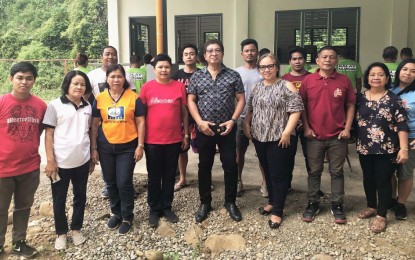
IMMERSION: Kauswagan Mayor Rommel Arnado is joined by officers and personnel of the provincial government of Camiguin during a two-day immersion and benchmarking at the Balay Silangan Community Rehabilitation Center in Lanao del Norte on Friday (Nov. 8, 2019). The group from Camiguin came to Kauswagan to learn about the best practices of the municipality on its drug rehabilitation program.
KAUSWAGAN, Lanao del Norte -- A group of officers and personnel from line agencies and the provincial government of Camiguin visited Kauswagan town in Lanao del Norte on Friday to learn about the best practices of the municipality on its drug rehabilitation program.
The group was sent by Governor JJ Romualdo to visit Kauswagan’s “Balay Silangan” community-based rehabilitation center for surrendered drug offenders in the locality. The contingent was joined by units of the Philippine National Police (PNP) and the Philippine Army stationed at the island province.
The group was allowed to immerse and interact with Balay Silangan workers and beneficiaries as they stayed in the center for two days.
They experienced day-to-day operations and observed some of the values formation and integrity sessions.
The group had hands-on experience on how the center is being managed and run by the local government unit (LGU). Knowledge-sharing was facilitated by the Kauswagan team primarily highlighting the success stories and challenges in maintaining the facility.
Camiguin is set to open its center this year.
“This immersion is very helpful to us as we come to know and learn about so many things in running Balay Silangan. We are seeing how operations are being run and how structured activities are facilitated. It is tough and challenging but we are committed to making it happen in Camiguin, as directed by our local chief executive. What is important is that the local government is able to provide support to drug offenders and a solution to the drug problem,” said Maida Baclayo of Camiguin’s provincial social welfare and development office.
“We are thankful to Governor Romualdo for this opportunity and to Kauswagan Mayor Rommel Arnado, his staff, and Balay Silangan personnel for receiving us well and showing us how successful they’ve been running this facility,” she added.
Balay Silangan, the national drug reformation program established by the Philippine Drug Enforcement Agency (PDEA) in January 2018 and implemented with the PNP and host LGUs, is a temporary refuge to reform drug offenders into self-sufficient and law-abiding members of society.
The PDEA had been pushing LGUs to provide services to surrendered drug offenders covering general interventions, such as continuing education and health awareness, psychological, spiritual and physical activities, counseling, moral recovery, values formation, personal and life skills, among others.
“We continue to provide these services to local drug offenders. Our services are given to Kauswaganons for free and we also provide guaranteed work to them as soon as they complete the program. The goal of the government is to create a support system for these drug offenders. This is an important step in creating solutions to this problem that our country is facing,” Kauswagan Mayor Rommel C. Arnado said.
“President Duterte has given his marching orders on this and we, in the local government, are committed to making this work. Now with Vice President Robredo taking the helm on anti-illegal drug efforts, we aim to strengthen our interventions to ensure that our communities continue to remain drug-free,” he added.
In addition to these services, Arnado added a premium to the rehabilitation program by bringing in the Department of Education’s alternative learning system (ALS) to Balay Silangan beneficiaries who have not completed high school.
According to Raymond Zamora of Balay Silangan Kauswagan, intensive modules are being used and prepared for the drug offenders, which includes a therapeutic community and Narcotics Anonymous (NA) for the three-month program.
These modules are the same ones being used in commercial rehabilitation institutions for drug dependents. The NA module follows the 12-Step Recovery Program of the popular Narcotics Anonymous non-profit fellowship of people recovering from drug addiction in the United States.
This program involves acceptance, decision making, fearless moral inventory, readiness, making direct amendments, and spiritual awakening, making it an effective process for drug dependency recovery.
While undergoing rehabilitation in Balay Silangan, beneficiaries are prevented from having communication from their families and the outside world.

In Kauswagan, they undergo lectures on Republic Act 9165 or the Comprehensive Dangerous Drugs Act and the effects of drugs as provided by the Department of Health; farming and agriculture sessions from the Department of Agriculture; and electrical skills training from Technical Education and Skills Development Authority, among others.
The Kauswagan LGU opened its Balay Silangan services on Oct. 8, 2018, making it the very first operational LGU-run rehabilitation and recovery center in northern Mindanao. A total of 38 individuals have completed the program since its inception and by the end of November, 13 more beneficiaries are set to graduate.
The national government has been pushing for continuous and relentless efforts of law enforcement and immediate response of LGUs in the all-out campaign to eradicate the drug problem in the country. (PR)
